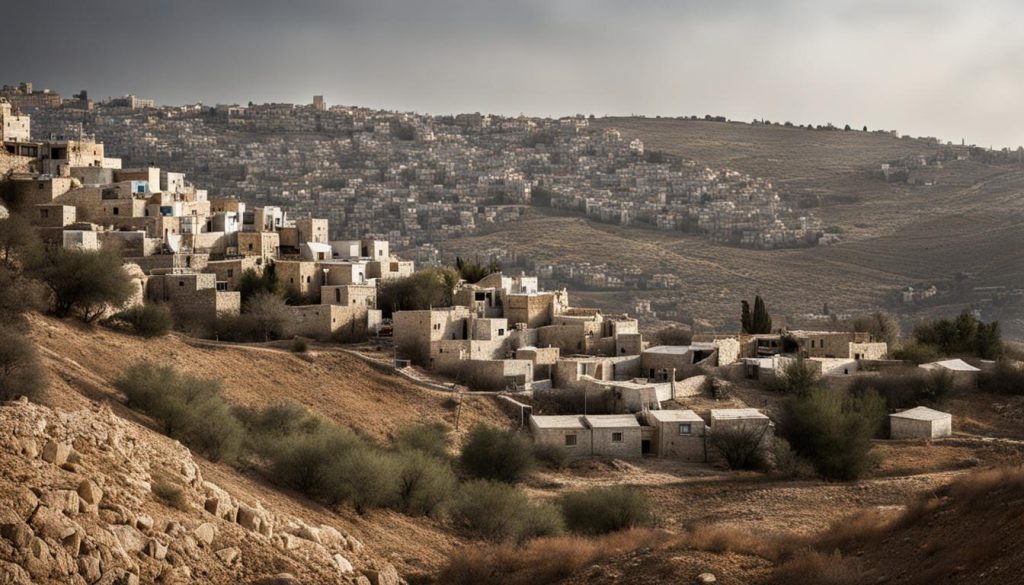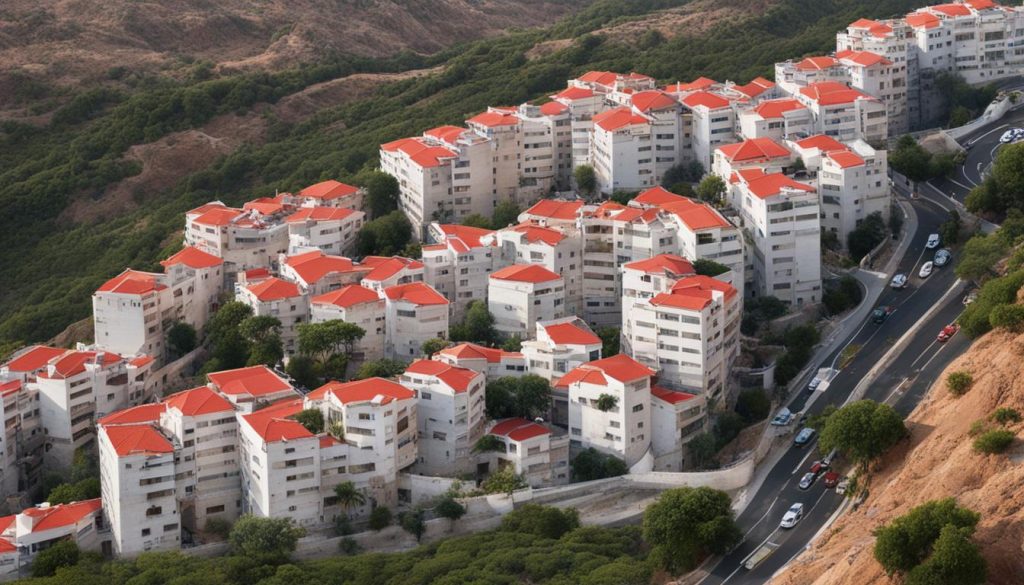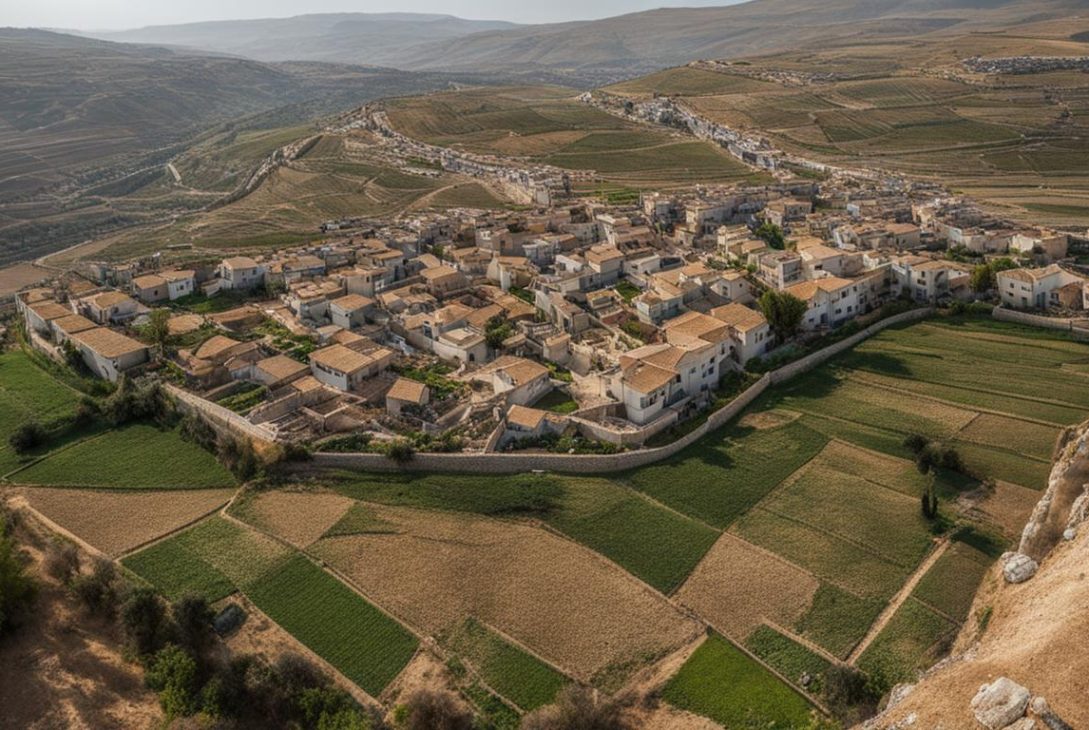Israeli settlements in the West Bank and East Jerusalem have long been a contentious issue in the Israeli-Palestinian conflict. These settlements, built by the Israeli government, have sparked controversy and complicated efforts to find a peaceful resolution. In this article, we will explore the historical context, political dimension, socioeconomic impact, controversy, humanitarian consequences, international perspectives, and the challenges of finding a resolution regarding Israeli settlements. We will also discuss the future of these settlements and their implications for the Israeli-Palestinian conflict.
Key Takeaways:
- Israeli settlements in the West Bank and East Jerusalem have been a major point of contention in the Israeli-Palestinian conflict.
- The expansion of Israeli settlements has caused significant controversy and has complicated efforts to find a two-state solution.
- The presence of these settlements has led to increased tensions and violence between Israelis and Palestinians.
- Israeli settlement policy has faced legal challenges and condemnation from the international community.
- The establishment and expansion of Israeli settlements have had significant socioeconomic and humanitarian consequences for Palestinians.
The Historical Context of Israeli Settlements
The establishment of Israeli settlements in the West Bank and East Jerusalem can be traced back to the period following the creation of the state of Israel in 1948. After the Israeli War of Independence, Israel occupied these territories, where it began constructing settlements to establish a Jewish presence and secure Israeli control over the land. These settlements have been a significant factor in the Israeli-Palestinian conflict and have faced international criticism.
Israeli settlement construction and expansion have been ongoing, leading to substantial changes on the ground and further complicating efforts to find a resolution to the conflict. The presence of settlements has fragmented the Palestinian territories, making it increasingly challenging to establish a contiguous and viable Palestinian state. The location of settlements in East Jerusalem, which Palestinians consider to be the capital of their future state, has been particularly contentious.
The historical context of Israeli settlements is deeply intertwined with the Israeli-Palestinian conflict. The establishment and expansion of settlements have been a key political and ideological issue within Israel, with some Israeli governments supporting and promoting their growth, while others have expressed concerns about their impact on security and the prospects for peace. Internationally, the expansion of settlements has been widely condemned, with many countries considering them to be illegal under international law.
| Key Points | Impact of Israeli Settlements |
|---|---|
| 1. Historical establishment | – Fragmentation of Palestinian territories |
| 2. Ongoing construction and expansion | – Complicating efforts for a two-state solution |
| 3. Location in East Jerusalem | – Contested capital for a future Palestinian state |
| 4. Political and ideological divisions | – Wide international condemnation |
The historical context of Israeli settlements provides a crucial backdrop for understanding the complexities of the Israeli-Palestinian conflict. The presence of settlements continues to be a significant challenge in the pursuit of peace and underscores the need for dialogue, compromise, and a mutually acceptable solution that addresses the concerns and aspirations of both Israelis and Palestinians.
The Political Dimension of Israeli Settlements
The political dimension of Israeli settlements has been a subject of intense debate and controversy both within Israel and on the international stage. The Israeli government’s policy of supporting and expanding settlements in the West Bank and East Jerusalem has faced widespread criticism and condemnation.
Many countries and international organizations consider Israeli settlements to be illegal under international law and view them as a major obstacle to peace. The United Nations has passed numerous resolutions calling for a halt to settlement construction and the dismantling of existing settlements. However, the Israeli government has continued to build and expand settlements, asserting that they are necessary for the security and well-being of Israeli citizens.
This political stance has created significant obstacles to the establishment of a viable Palestinian state and has drawn international criticism for undermining the prospects for a peaceful resolution to the Israeli-Palestinian conflict. The expansion of settlements has fragmented the Palestinian territories, making it increasingly difficult to achieve a contiguous and independent Palestinian state.

Socioeconomic Impact of Israeli Settlements
The presence of Israeli settlements in the West Bank and East Jerusalem has had a profound socioeconomic impact on both Israelis and Palestinians. The Israeli government has provided significant funding and subsidies for settlements, making it financially attractive for Israeli families to live in these areas. As a result, the settlements have experienced population growth and economic development, leading to disparities between Israelis living in settlements and Palestinians living in neighboring communities.
| Israeli Settlers | Palestinians | |
|---|---|---|
| Economic Opportunities | Greater access to jobs, infrastructure, and resources in settlements | Limited access to economic opportunities due to restrictions and lack of investment in Palestinian areas |
| Access to Land and Resources | Control and dominance over land and natural resources | Land confiscation and limited access to resources |
| Housing | Subsidized housing and government support | Limited access to affordable housing |
The socioeconomic disparities created by Israeli settlements have contributed to increased tensions and resentment between Israelis and Palestinians, perpetuating the cycle of conflict and making a peaceful resolution more challenging to achieve.
The Socioeconomic Impact of Israeli Settlements
The presence of Israeli settlements in the West Bank and East Jerusalem has had significant socioeconomic implications for both Israelis and Palestinians. The construction and expansion of these settlements have been financially supported by the Israeli government, making it financially appealing for Israeli families to live in these settlements rather than within the borders of Israel. This has led to population growth and economic development in the settlements, creating an economic disparity between Israelis living in settlements and Palestinians living in neighboring communities.
According to data compiled by the Palestinian Central Bureau of Statistics, the Israeli settlements employ approximately 30,000 Palestinians, who are often forced to work in low-wage, menial jobs due to limited economic opportunities. Palestinians living in close proximity to the settlements also face restrictions on their movement, limiting their access to employment, healthcare, and educational opportunities.
The socioeconomic impact of Israeli settlements has further fueled tensions and perpetuated inequality in the region. The settlements have brought about a significant increase in infrastructure development, including roads, schools, and hospitals, primarily benefiting Israeli settlers. Meanwhile, Palestinian communities have faced limited access to basic services and resources, exacerbating socioeconomic disparities and contributing to the ongoing Israeli-Palestinian conflict.
The Socioeconomic Impact in Numbers
| Israeli settlements | West Bank | East Jerusalem | |
|---|---|---|---|
| Population | Approximately 450,000 | Approximately 2.8 million Palestinians | |
| Unemployment rate | 5.5% | 19.6% | |
| Access to clean water | 97% of Israeli settlers have access to clean water | Approximately 21% of Palestinians in the West Bank do not have access to clean water | |
| Access to healthcare | Israeli settlers have access to well-equipped healthcare facilities | Palestinians face limited access to quality healthcare facilities and services |
These statistics illustrate the stark socioeconomic disparities between Israeli settlers and Palestinians living in the West Bank. The unequal distribution of resources and opportunities, coupled with the limited access to basic services, perpetuates a cycle of poverty and inequality for Palestinians, further fueling tensions between the two communities.
In summary, the presence of Israeli settlements in the West Bank and East Jerusalem has had profound socioeconomic implications. The settlements have led to population growth and economic development in the settlements themselves, benefiting Israeli settlers. However, Palestinians living in close proximity to the settlements face economic disadvantages and limited access to basic services. These socioeconomic disparities contribute to the ongoing Israeli-Palestinian conflict and hinder efforts to find a just and lasting resolution.
The Controversy Surrounding Israeli Settlements
The establishment and expansion of Israeli settlements in the West Bank and East Jerusalem have been the subject of intense controversy and debate both within Israel and internationally. The construction and growth of these settlements have raised significant concerns and have been met with criticism from various quarters. This section explores the ongoing controversy surrounding Israeli settlements, examining their impact and implications.
The International Perspective
Internationally, Israeli settlements have faced widespread condemnation and are viewed by many countries and international organizations as illegal under international law. Numerous United Nations resolutions have called for a halt to settlement construction and expansion, considering it an obstacle to peace in the Israeli-Palestinian conflict. The international community has consistently called for the establishment of a viable Palestinian state, with settlements being seen as a major hindrance to achieving this goal.
“The expansion of Israeli settlements undermines the prospects for a negotiated two-state solution and threatens the viability of a future Palestinian state.” – United Nations statement
Humanitarian Concerns
The humanitarian impact of Israeli settlements on Palestinians living in the West Bank and East Jerusalem cannot be overlooked. The construction of settlements often involves the confiscation of Palestinian land, displacement of families, and restrictions on movement, exacerbating the already challenging living conditions for Palestinians. The presence of settlements has led to economic disparities and limited access to resources, further contributing to tensions and deepening the Israeli-Palestinian conflict.
Peace Process Implications
The continued expansion of Israeli settlements has complicated efforts to find a peaceful resolution to the Israeli-Palestinian conflict. The establishment of settlements in disputed territories has fragmented Palestinian lands, making it increasingly difficult to establish a viable and contiguous Palestinian state. The issue of settlements, particularly in East Jerusalem, has also been a major obstacle in peace negotiations, with different parties holding divergent positions on their legitimacy and future.
| Key Points | Implications |
|---|---|
| Israeli settlements are viewed as illegal under international law. | This has led to diplomatic tensions and strained relations between Israel and multiple countries. |
| The presence of settlements deepens divisions and fuels tensions between Israelis and Palestinians. | This complicates the search for a peaceful resolution to the conflict and hampers the prospects for a two-state solution. |
| The establishment of settlements has humanitarian consequences for Palestinians, leading to displacement and restricted access to resources. | This further exacerbates the challenging living conditions for Palestinians and contributes to the ongoing conflict. |
Despite the controversy surrounding Israeli settlements, their future remains uncertain. The Israeli government has shown no signs of halting settlement construction, despite international pressure. The resolution of the Israeli-Palestinian conflict and the fate of Israeli settlements will ultimately depend on the willingness of all parties involved to engage in meaningful dialogue, compromise, and find a mutually acceptable solution that takes into account the concerns of both Israelis and Palestinians.
The Humanitarian Consequences of Israeli Settlements
The establishment and expansion of Israeli settlements in the West Bank and East Jerusalem have had significant humanitarian consequences for Palestinians living in these areas. The construction of settlements often involves the confiscation of Palestinian land and the displacement of Palestinian families, resulting in the loss of homes, livelihoods, and access to resources.
Furthermore, Palestinians living in close proximity to settlements face restrictions on their movement, access to basic services, and economic opportunities. These restrictions have a direct impact on their quality of life, making it more difficult for them to access healthcare, education, and employment. The presence of Israeli settlements has fragmented Palestinian communities and hindered their ability to develop and thrive.
Moreover, the establishment of Israeli settlements has led to an increase in violence and tensions between Israelis and Palestinians. The proximity of settlements to Palestinian communities often results in clashes and confrontations, further exacerbating the already challenging living conditions in the region.
“The construction and expansion of Israeli settlements not only violate the rights of Palestinians but also undermine the prospects for peace and stability in the region. The international community must take a firm stance against these settlements and work towards a just and lasting resolution to the Israeli-Palestinian conflict.”
The Humanitarian Impact of Israeli Settlements
The humanitarian consequences of Israeli settlements are wide-ranging and deeply troubling. Palestinians living in the West Bank and East Jerusalem continue to face daily challenges and hardships as a result of the presence of these settlements. The international community must continue to support efforts to address these humanitarian concerns and work towards a peaceful and equitable solution to the Israeli-Palestinian conflict.
| Humanitarian Consequences of Israeli Settlements | Impact |
|---|---|
| Displacement of Palestinian families | Loss of homes, livelihoods, and access to resources |
| Restrictions on movement | Limited access to healthcare, education, and employment |
| Increase in violence and tensions | Clashes and confrontations between Israelis and Palestinians |

International Perspectives on Israeli Settlements
The issue of Israeli settlements in the West Bank and East Jerusalem has garnered significant attention and sparked intense debate on the international stage. Different countries and organizations have expressed divergent perspectives and opinions on the matter, leading to a complex web of international perspectives.
While many countries and international organizations, including the United Nations, view Israeli settlement expansion as a violation of international law, others hold a different viewpoint. Some countries argue that Israeli settlements are a legitimate response to security concerns and a necessary means of safeguarding the Israeli population.
This division of opinions has resulted in diplomatic tensions and strained relations between Israel and various countries. It has also hindered efforts to find a peaceful resolution to the Israeli-Palestinian conflict, as the issue of settlements remains a major stumbling block in negotiations.
Examples of International Perspectives
“Israeli settlement construction constitutes a flagrant violation of international law and a major obstacle to achieving a just and lasting peace in the Middle East.”
– United Nations Security Council Resolution 2334, December 2016
“Israel has the right to build its settlements in the Jewish homeland of Judea and Samaria. These settlements are not an obstacle to peace, but rather contribute to the security and well-being of Israelis.”
– Statement by the Israeli Ministry of Foreign Affairs, 2021
| Country/Organization | Perspective on Israeli Settlements |
|---|---|
| United States | Historically, the United States has expressed concerns about Israeli settlement expansion, considering it an obstacle to peace. However, the exact stance may vary depending on the current administration. |
| European Union | The European Union has consistently criticized Israeli settlement construction and considers it illegal under international law. They have called for a cessation of settlement activities. |
| Gulf Arab States | In recent years, some Gulf Arab states have taken steps to normalize relations with Israel, indicating a shift in their stance towards Israeli settlements. However, public opinion within these countries remains divided. |
| Palestinian Authority | The Palestinian Authority views Israeli settlements as a grave violation of their rights and aspirations for statehood. They demand a complete cessation of settlement construction as a prerequisite for negotiations. |
The international community’s differing perspectives on Israeli settlements highlight the complexity of the issue and the challenges it poses to finding a resolution to the Israeli-Palestinian conflict. As negotiations continue, bridging these gaps in viewpoints will be crucial for achieving a sustainable and just peace.
The Challenges of Finding a Resolution
The Israeli-Palestinian conflict has been characterized by numerous challenges in finding a resolution, with Israeli settlements playing a significant role in hindering progress. The expansion of settlements has fragmented the Palestinian territories, making it increasingly difficult to establish a contiguous and viable state. The status of Jerusalem, where many Israeli settlements are located, further complicates negotiations and agreements.
In addition to the physical challenges presented by settlements, there are also deep-rooted political and ideological divisions that pose obstacles to finding a mutually acceptable solution. The Israeli government has shown no signs of slowing down settlement construction or dismantling existing settlements, despite international condemnation. This stance, coupled with differing perspectives among various parties involved in the conflict, has contributed to the complexity of the issue.
The Impact of Israeli Settlements on Peace Efforts
The presence of Israeli settlements has far-reaching implications for peace efforts in the region. The expansion of settlements has not only deepened divisions but has also intensified tensions between Israelis and Palestinians. The continued construction and expansion of settlements have been met with international criticism and condemnation, leading to strained relations between Israel and other countries.
The establishment and expansion of Israeli settlements have also had significant humanitarian consequences for Palestinians living in the West Bank and East Jerusalem. The confiscation of Palestinian land and the displacement of families have resulted in the loss of homes, livelihoods, and access to resources. These humanitarian challenges further exacerbate the Israeli-Palestinian conflict and contribute to the ongoing cycle of violence and unrest.
As the future of Israeli settlements remains uncertain, the resolution of the Israeli-Palestinian conflict will require extensive dialogue, compromise, and a commitment from all parties involved to find a mutually acceptable solution. It is crucial to address the challenges posed by settlements and to prioritize the establishment of a sustainable peace agreement that respects the rights and aspirations of both Israelis and Palestinians.
| Challenges | Impact |
|---|---|
| Fragmentation of Palestinian territories | Difficulty in establishing a contiguous and viable Palestinian state |
| Political and ideological divisions | Obstacles to finding a mutually acceptable solution |
| Tensions and strained relations | Contributes to the complexity of the issue and hinders peace efforts |
| Humanitarian consequences | Loss of homes, livelihoods, and access to resources for Palestinians |
The Future of Israeli Settlements
The future of Israeli settlements is a subject of intense debate and speculation. Despite international pressure and condemnation, the Israeli government has shown no signs of slowing down settlement construction or dismantling existing settlements. The impact of these settlements on the Israeli-Palestinian conflict and the prospects for peace will continue to be a central issue in any future negotiations.
The expansion of Israeli settlements has created significant challenges for finding a resolution to the Israeli-Palestinian conflict. The establishment of settlements has fragmented the Palestinian territories, making the establishment of a contiguous and viable Palestinian state increasingly difficult. The status of Jerusalem, where many Israeli settlements are located, further complicates peace negotiations.
The resolution of the Israeli-Palestinian conflict and the fate of Israeli settlements ultimately depend on the willingness of all parties involved to engage in dialogue, compromise, and find a mutually acceptable solution. However, the entrenched political and ideological divisions, as well as the divergent positions on settlements, pose significant obstacles to reaching a resolution.
| Israeli Settlements | Impact | |
|---|---|---|
| Construction | Continued construction and expansion of settlements | Fragmentation of Palestinian territories, hindered establishment of a viable Palestinian state |
| International Pressure | Condemnation from the international community | Diplomatic tensions and strained relations with other countries |
| Challenges | Obstacles to peace negotiations | Entrenched political divisions, ideological differences, and divergent positions on settlements |
The resolution of the Israeli-Palestinian conflict and the future of Israeli settlements will require bold leadership and a commitment to finding common ground. Ultimately, a just and lasting peace can only be achieved through dialogue, compromise, and respect for the rights and aspirations of both Israelis and Palestinians.

Conclusion
The issue of Israeli settlements in the West Bank and East Jerusalem has been a highly contentious and complex topic within the Israeli-Palestinian conflict. These settlements, built by the Israeli government and supported by subsidies, have had far-reaching implications in various aspects. The establishment and expansion of these settlements have deepened political, historical, socioeconomic, and humanitarian divisions, complicating efforts to find a resolution to the conflict.
Internationally, there are differing opinions on Israeli settlements, with some countries and organizations considering them illegal under international law, while others view them as crucial for Israeli security. This diversity of perspectives has further complicated the path towards a peaceful resolution.
Moving forward, the future of Israeli settlements will continue to be a central point of debate and negotiation. The impact of these settlements on the Israeli-Palestinian conflict and the prospects for peace cannot be ignored. The resolution of the conflict and the fate of Israeli settlements ultimately depend on the willingness of all parties involved to engage in dialogue, compromise, and work towards a mutually acceptable solution.
In conclusion, the presence and expansion of Israeli settlements have had significant ramifications, exacerbating tensions and hindering the path to peace. This issue remains a pressing concern and will require sustained effort and commitment to address and resolve in the quest for a just and lasting peace between Israelis and Palestinians.
FAQ
What are Israeli settlements?
Israeli settlements are communities built by the Israeli government in the West Bank and East Jerusalem. These settlements are predominantly inhabited by Israeli citizens and are seen by many as an obstacle to peace between Israelis and Palestinians.
Why are Israeli settlements considered controversial?
Israeli settlements are considered controversial because they are built on land that is internationally recognized as occupied territory. Many countries and international organizations consider Israeli settlements to be illegal under international law and view their expansion as an obstacle to a two-state solution.
How do Israeli settlements impact the Israeli-Palestinian conflict?
Israeli settlements deepen divisions and tensions between Israelis and Palestinians. They complicate efforts to find a resolution to the conflict by fragmenting the Palestinian territories and making the establishment of a viable Palestinian state more difficult.
What is the international community’s stance on Israeli settlements?
The international community is divided on the issue of Israeli settlements. While some countries and international organizations condemn Israeli settlement expansion and consider it a violation of international law, there are also countries that support Israeli settlement policy and view the settlements as legitimate and necessary for the security of Israelis.
What are the humanitarian consequences of Israeli settlements?
The construction and expansion of Israeli settlements often involve the confiscation of Palestinian land and the displacement of Palestinian families. Palestinians living near settlements face restrictions on their movement, access to resources, and economic opportunities, which further complicates their living conditions and contributes to the Israeli-Palestinian conflict.
What is the future of Israeli settlements?
The future of Israeli settlements remains uncertain and continues to be a subject of intense debate. The Israeli government has shown no signs of halting settlement construction or dismantling existing settlements, despite international condemnation. The resolution of the Israeli-Palestinian conflict and the fate of Israeli settlements depend on the willingness of all parties involved to engage in dialogue and find a mutually acceptable solution.
Source Links
- https://blog.ricksteves.com/blog/settlements-in-the-west-bank-from-an-israeli-point-of-view/
- https://sbadamsthetower.com/10303/news/the-complexity-of-the-recent-conflict-in-israel/
- https://www.nytimes.com/2023/11/22/opinion/israel-palestinians-arabs.html
Discovering the Complexities of Israeli Settlements Humanitarian Concerns The Political Dimension of Israeli Settlements The Socioeconomic Impact of Israeli Settlements
Last modified: January 17, 2024





